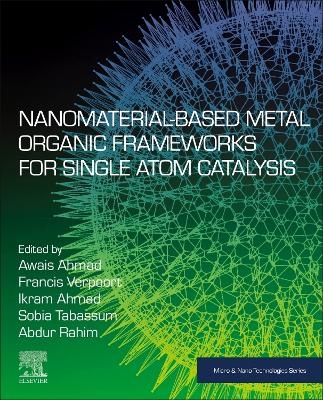
Nanomaterial-Based Metal Organic Frameworks for Single Atom Catalysis
Elsevier Science Publishing Co Inc (Verlag)
978-0-12-824524-8 (ISBN)
Metal organic frameworks (MOFs) are hybrid organic–inorganic, porous, crystalline nanomaterials, and have aroused great attention in the field of catalysis because of their crystalized nano- (lt;2 nm) or meso- (2–50 nm) porous structure, extremely high surface area, and significant chemical diversity. This nanomaterial-based metal organic framework, as a single atom catalysis, enhances the catalytic ability of dispersed single atoms.
Dr. Awais Ahmad is a Researcher at the Department of Organic Chemistry, University of Cordoba in Spain. He completed his graduation from Government College University Faisalabad, Pakistan, and obtained his master's degree from the University of Lahore, Pakistan. Dr. Ahmad's research focuses on various areas including nanomaterials, composite materials, coated materials, heterogeneous catalysis, MOF, self-sacrifice MOF, single atom catalysis, photocatalysis, and electrochemical sensor formulations. He has applied these materials to address challenges in wastewater treatment, heavy metal removal, organic pollutant degradation, CO2 conversion, supercapacitors, dye-sensing solar cells, gel electrolytes, hazardous metal sensing in wastewater, conversion of hazardous gases, nitrogen fixation, catalysis for organic transformation, Li-S batteries, GCE nafion fiber, and water splitting. For about two decades, Prof. Francis Verpoort has carried out broad and fruitful teaching and research activity at Ghent University in various areas of materials chemistry, including organometallics, catalysis, molecular spectroscopy, related with notable applications in the production of fine chemicals and advanced polymeric materials. He has developed an extensive international scientific cooperation with scientists worldwide, taking part as an active member in different international scientific organizations, as well as in numerous successful bilateral collaboration projects with foreign academic institutions and universities across Europe, China, Russia, India, and in the UAE. In 2011, he was also appointed as Chair Professor at Wuhan University of Technology, China, where he established a research group covering organometallics and materials chemistry. Prof. Verpoort’s main research interests concern the structure and mechanisms of organometallic material chemistry, homogeneous and heterogeneous catalysis, MOFs and MOPs, Porous Organic Polymers (POPs), water splitting, olefin metathesis and its applications in fine chemicals and polymers, CO2 conversion, polymers. A particular specialism is the application of MOFs, POPs for the environment, water purification, and downstream upgrading applications. Dr. Ikram Ahmad is an assistant professor in the Department of Chemistry at the University of Sahiwal, Pakistan. His research interests are inorganic material chemistry, catalysis, nanomaterials and their application in organic synthesis, organic transformations, degradation, sensing, and photocatalysis. Sobia Tabassum is Associate Professor in the Department of Biological Science at the International Islamic University, Islamabad, Pakistan. Her research interests are in molecular biotechnology and pharmaceutical chemistry, focusing on efficient combinatorial therapies using combination analysis of natural epigenetic drugs and nanoparticles for targeted drug delivery system in cancer. Abdur Rahim is Assistant Professor in the Interdisciplinary Research Centre in Biomedical Materials, COMSATS University Islamabad, Pakistan. His research areas include synthesis and characterization of 2D nanomaterials for sensors and biosensors applications, functionalization of mesoporous/nano-materials and application as sensors and biosensors, hybrid organic-inorganic materials synthesis for sensing and bio-sensing applications, biomimetic nanomaterials for biosensors applications, and plasmonic nanomaterials for sensors and biosensors applications.
1. Metal organic frameworks (an overview)
2. Nanomaterials and catalysis
3. Process and manufacturing of nanomaterial-based metal organic frameworks
4. Biological methods for fabricating nanomaterial-based metal organic frameworks
5. Development and characterization of nano MOFs
6. Properties and potential applications of nanomaterial-based MOFs
7. Characterization and theoretical considerations of metal organic frameworks
8. Catalysis and its fundamentals
9. Metal organic frameworks in catalysis
10. Single atom catalysts
11. Synthesis and properties of single atom catalysts
12. Role of MOFs as single atom catalysis
13. Effects of nanomaterial-based MOFs on single atom catalysis
14. Applications of MOF derived single atom catalysts
15. Nanomaterial based MOF derived single atom catalysts for electrolytic conversion of energy
16. Advantages of using nano MOFs as single atom catalysis
17. Future aspects of nanomaterial-based MOFs as single atom catalysis
| Erscheinungsdatum | 02.03.2023 |
|---|---|
| Reihe/Serie | Micro & Nano Technologies |
| Sprache | englisch |
| Maße | 191 x 235 mm |
| Gewicht | 450 g |
| Themenwelt | Technik ► Maschinenbau |
| ISBN-10 | 0-12-824524-7 / 0128245247 |
| ISBN-13 | 978-0-12-824524-8 / 9780128245248 |
| Zustand | Neuware |
| Haben Sie eine Frage zum Produkt? |
aus dem Bereich


